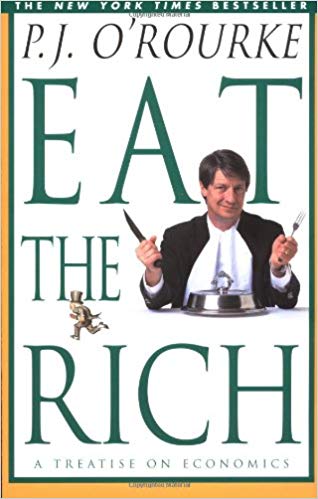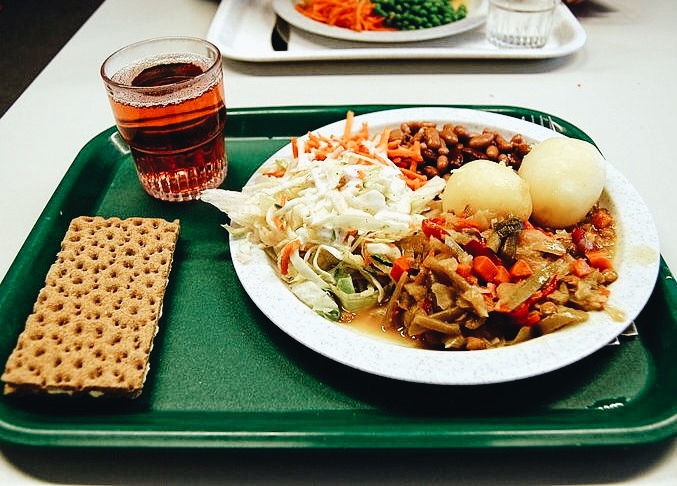Sweden is often hailed for its sweeping cultural and political emphasis on the equality of all things. But while the popular discourse tends to center on its progressive economic policies and far-reaching public services, the country’s focus on fairness stretches across the spheres of Swedish society—including, more recently, its school cafeterias.
At a local school in Falun, head cook Annica Eriksson was ordered by city officials to pursue a bit more mediocrity in her cuisine. Her food was good—too good.
Eriksson had become popular among students, offering freshly baked breads and varied lunch buffets that were known to include up to 15 different fresh vegetables and a range of high-quality proteins. Yet now she must diverge from her hand-crafted approach, told that it’s both “unfair” and out of compliance, given the lack of such offerings at nearby schools.
According to The Local:
The municipality has ordered Eriksson to bring it down a notch since other schools do not receive the same calibre of food — and that is “unfair”. Moreover, the food on offer at the school doesn’t comply with the directives of a local healthy diet scheme which was initiated in 2011, according to the municipality.
“A menu has been developed… It is about making a collective effort on quality, to improve school meals overall and to try and ensure everyone does the same,” Katarina Lindberg, head of the unit responsible for the school diet scheme, told the local Falukuriren newspaper.
As for Eriksson, she is perplexed by the decision. “It has been claimed that we have been spoiled and that it’s about time we do as everyone else,” Eriksson said. “…I have not had any complaints.” Eriksson says this is not an economic decision; her meals were always well within the municipality’s prescribed budget, provided at no additional cost compared to the alternatives.
Predictably, the city’s decision has “prompted outrage among students and parents,” according to the paper, leading a group of fourth graders to start their own petition to restore Eriksson’s meals.
“From now on, the school’s vegetable buffet will be halved in size and Eriksson’s handmade loafs will be replaced with store-bought bread,” the story concludes. “Her traditional Easter and Christmas smörgåsbords may also be under threat.”
It’s a bit of a humorous tale, but with more than a bit of a dystopian edge. And while it may just be a peculiar local-news anomaly—unrelated to broader trends in Swedish society—the city’s basic sentiment aligns rather well with many interpretations of the country’s basic ethos.
I’m reminded of satirist P.J. O’Rourke’s observation in his 1998 book, Eat the Rich: A Treatise on Economics, which includes a chapter dedicated to Sweden’s “good socialism”—that peculiar brand of economic egalitarianism wherein rash redistribution has somehow coincided with relative peace and prosperity.
Even O’Rourke is stunned to find such a neat-and-tidy realm of politeness and economic stability. “The Swedes, left wing though they may be, are thoroughly bourgeois,” O’Rourke writes. “They drive Saabs like we do, know their California chardonnays, have boats and summer cottages, and vacation in places that are as much like home as possible, which is to say at Disneyland.”
 Such fantastical rosiness is quickly curbed, however, as O’Rourke proceeds to offer lengthy critiques about the actual (in)stability and long-term (un)feasibility of Sweden’s seeming successes. As Swedish researcher Dr. Carl-Johan Westholm puts it: “Sweden is borrowing its prosperity.”
Such fantastical rosiness is quickly curbed, however, as O’Rourke proceeds to offer lengthy critiques about the actual (in)stability and long-term (un)feasibility of Sweden’s seeming successes. As Swedish researcher Dr. Carl-Johan Westholm puts it: “Sweden is borrowing its prosperity.”
Regardless, the economic fragilities are the least of O’Rourke’s concerns, which are more set on the seeming “perfection” of Swedish society more broadly, and the ideal of equality that led thereto. Although O’Rourke is at first pleased to find “no visible crazy people” in the public squares, the lifeless humdrumness of it all quickly leads to great unease.
Indeed, over 20 years before the latest peculiar project of lunch-lady conformity, O’Rourke had this to say about the country’s cuisine:
There are many delightful things about Sweden, but almost none of them are meals…Maybe the problem with Swedish food has something to do with the almost obsessive Swedish interest in fairness. Maybe if fairness is a society’s most-esteemed value, then ‘average’ becomes a great compliment. Mmm, honey, that was an average dinner.
In fact, this is nearly the case. The word in Swedish is lagom, which translates, more or less as ‘just enough’ or ‘in moderation’ or ‘sufficient.’ And lagom really is used as a compliment.
O’Rourke observes other mundane features of fairness across Swedish culture, from parenting to healthcare to art to religion and beyond. Everything points to that same basic concern: where fairness is the highest value and virtue, mediocrity is bound to ensue.
O’Rourke eventually sees that such excessive “earnestness” brings a subtle temptation to resist to the good—or, perhaps, the better—life. If life is all about cutting the pie evenly and outsourcing the “big things” to big brother—all while still clinging to your washer and dryer and that cute little cabin on the bay—Sweden may be the spot. But is the “average society” wherein “nobody is doing anything bizarre” one that’s really worth pursuing?
Of course, the rush to moderation and mediocrity is not, by itself, sufficient to make an argument against the Swedish approach to politics and economics. But neither are our siloed observations and assessments about economic opportunity, health care access, paid family leave or life expectancy. As the economy goes, so goes the culture—and back and forth and back again.
“Secure and lagom though Sweden may be, there is nonetheless something frightening about socialism, something that scared me as much as a close look at capitalism had,” O’Rourke concludes (with plenty of cheek). “The last time I walked through Gamla Stan, I didn’t wonder where the crazy people were. In Sweden the craziness is redistributed fairly. They’re all a little crazy.”
When the romance of life is replaced by superficial notions of “equality,” culture is more often summoned straight to the bottom. But the best case appears to only scratch at the middle, requiring half-hearted freedom to fill in the gaps. If socialists are lucky enough to avoid gulags and mass starvation, “Mediocre Lunches for All” may be the realistic ideal.
As Falun’s localized effort at lunch lady equality confirms, a society that worships “fairness” above all else may, indeed, find a way to survive and succeed. But only fairly.
Watch highlights of P.J. O’Rourke’s remarks at the Acton Institute’s 23rd Anniversary Dinner.

